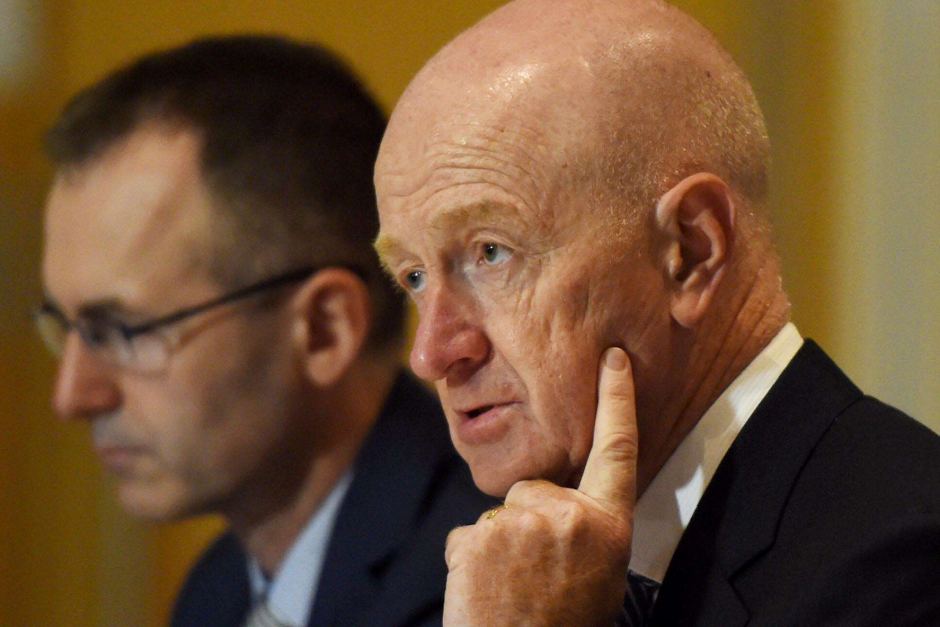Category: Economic Trends / Money and Monetary Policy / International Financial Crisis / Federal Parliament
'Markets are dropping their bundle' over China: RBA governor
Friday, 12 Feb 2016 09:18:45 | Michael Janda

The crash occurred on June 20 in downtown Nanjing, capital of east China’s Jiangsu Province, when a BMW hit a Mazda, almost breaking up the Mazda and killing two occupants on board. Police found the BMW driver, Wang Jijin, 35, was traveling at almost 200 kilometers per hour.
Reserve Bank governor Glenn Stevens has played down recent financial market volatility, saying it is a change in attitude rather than economic conditions.
Key points
- Chinese move to more flexible exchange rate positive long-term, even if volatile short-term
- Australian banks' exposure to potentially bad oil and gas debts relatively low
- Stevens said banks have little case for independent interest rate rises
Speaking to the House of Representatives Economics Committee in his semi-annual testimony, Mr Stevens said there has been no economic trigger for the recent share sell-off around the world.
"Markets are dropping their bundle. There are some latent issues that have been there all along, actually, on which people have now chosen to focus more strongly than they were a couple of months back," he argued.
Central amongst those issues is the health of China's economy.
Last year China recorded its slowest annual economic growth in a quarter of a century, at 6.9 per cent.
On that front, Mr Stevens said the recent fall in value of China's currency, the yuan, has been modest and should be a long-term positive.
"I think if they're heading towards a world where there's more market flexibility in those key prices in the longer run, that's to be welcomed, even though the road to get to the long run may have some bumps and pot holes in it," he told the assembled Members of Parliament.
Those potholes have included a fall of more than 20 per cent so far this year on China's major share market, with Europe down around 15 per cent and the US and Australia off around 10 per cent in 2016.
It's pretty unlikely we're going to be raising rates any time soon. The question will be should we sit or go down some more.
Glenn Stevens, RBA governor
Mr Stevens puts some of this decline down to unrealistic assumptions about what state authorities in China can achieve.
"If people around the world were operating on the assumption that Chinese policymakers had this aura of invincibility and could fix all problems, as it turns out, like the rest of us, they can't fix every problem," he said.
Banks healthy, no case for independent rate rises
Mr Stevens was peppered with questions from the committee members about the health of Australia's banks, given that much of the recent share market sell-off has centred on financial firms.
Much of the concern around banks has been centred on their exposure to debt in the oil and gas sector.
I don't really see much of a case for independent increases in lending rates based on funding costs.
Glenn Stevens, RBA governor
Commonwealth Bank chief executive Ian Narev played down his bank's exposure when announcing a $4.6 billion half-year profit earlier this week, and Mr Stevens said that applied across the Australian banking sector.
"The evidence that we have is that the exposure of our local banks to the resources sector generally is just a few percentage points of their balance sheet, and then the oil would be a sub-set of that," he observed.
"So there'll be some exposure, but I think it's quite small."
With the banks in reasonable health, posting record profits and not seeing a major rise in funding costs, Mr Stevens said the case for any further out-of-cycle interest rate increases by them is weak.
"For long-term debt, the new debt that's being sold to replace debt that's rolling over, it's still being sold into the market at a lower interest rate than the debt than it's replacing," he said.
"So the marginal funding cost has gone up a bit but it's still lower than the average funding cost in the stock that's outstanding ... I don't really see much of a case for independent increases in lending rates based on funding costs as they've evolved just lately."
As for official interest rates, Mr Stevens confirmed what most analysts have been predicting, that rates are likely to remain steady for most or all of 2016.
"It's, I think, pretty unlikely we're going to be raising rates any time soon," he said.
"The question will be should we sit or go down some more, and that's been the question for some years now, actually."
- About Us
- |
- Terms of Use
- |
-
 RSS
RSS - |
- Privacy Policy
- |
- Contact Us
- |
- Shanghai Call Center: 962288
- |
- Tip-off hotline: 52920043
- 沪ICP证:沪ICP备05050403号-1
- |
- 互联网新闻信息服务许可证:31120180004
- |
- 网络视听许可证:0909346
- |
- 广播电视节目制作许可证:沪字第354号
- |
- 增值电信业务经营许可证:沪B2-20120012
Copyright © 1999- Shanghai Daily. All rights reserved.Preferably viewed with Internet Explorer 8 or newer browsers.




 Send to Kindle
Send to Kindle